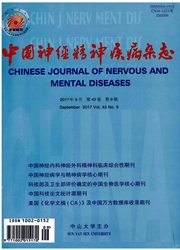

 中文摘要:
中文摘要:
抑郁障碍的治疗现状尚不容乐观,临床惯常治疗常存在治疗策略选择缺乏一致性、治疗过程质量控制不佳、药物剂量不充分、疗程不足或无效疗程的无谓延长等诸多缺陷,导致患者临床治愈机会降低。基于评估的治疗(measurement-based care,MBC)策略通过对治疗过程的重要环节,如疾病严重程度、依从性、不良反应和耐受性等进行连续评估,并在评估的基础上对抗抑郁剂剂量和疗程进行适时、恰当调整,更有助于改善抑郁障碍治疗结局。本文对于抗抑郁MBC策略的基本概念、发展现状、策略制定原则等进行综述,并展望基于电子化精神卫生理念,结合信息化技术手段实施MBC策略的可行性。
 英文摘要:
英文摘要:
The overall treatment outcome of depressive disorder is far below optimistic. Some imperfections in routine antidepressant treatment strategies(TAU), such as non-standardized treatment options, poor process monitoring in treatment, inadequate dosage and/or course of antidepressants, and unnecessary extension of ineffective strategies, decline the curative rate of the patients with depressive disorder. Meanwhile,the measurement-based care (MBC) focuse on the periodical assessments of the treatment in the process of quality control including severity of illness, compliance, adverse effects and tolerability. The outcome of depressive disorders may be improved by making necessary and appropriate adjustment of dosage and course of antidepressants based on the assessment of the treatment. This review summarizes the basic concept, present situation and the principle of the strategy of MBC in the antidepressant treatment. The feasibility of the combination of information technology and MBC strategy based on the e-mental health is also discussed.
 同期刊论文项目
同期刊论文项目
 同项目期刊论文
同项目期刊论文
 A study of N-methyl-D-aspartate receptor gene (GRIN2B) variants as predictors of treatment-resistant
A study of N-methyl-D-aspartate receptor gene (GRIN2B) variants as predictors of treatment-resistant Guidelines concordance of maintenance treatment in euthymic patients with bipolar disorder: Data fro
Guidelines concordance of maintenance treatment in euthymic patients with bipolar disorder: Data fro Difference in remission in a Chinese population with anxious versus nonanxious treatment-resistant d
Difference in remission in a Chinese population with anxious versus nonanxious treatment-resistant d Association between brain-derived neurotrophic factor genetic polymorphism Val66Met and susceptibili
Association between brain-derived neurotrophic factor genetic polymorphism Val66Met and susceptibili Atypical features and treatment choices in bipolar disorders: a result of the National Bipolar Mania
Atypical features and treatment choices in bipolar disorders: a result of the National Bipolar Mania Validation of the Chinese Version of the Short TEMPS-A and its application in patients with mood dis
Validation of the Chinese Version of the Short TEMPS-A and its application in patients with mood dis IL-23 and TGF-beta1 levels as potential predictive biomarkers in treatment of bipolar I disorder wit
IL-23 and TGF-beta1 levels as potential predictive biomarkers in treatment of bipolar I disorder wit 期刊信息
期刊信息
